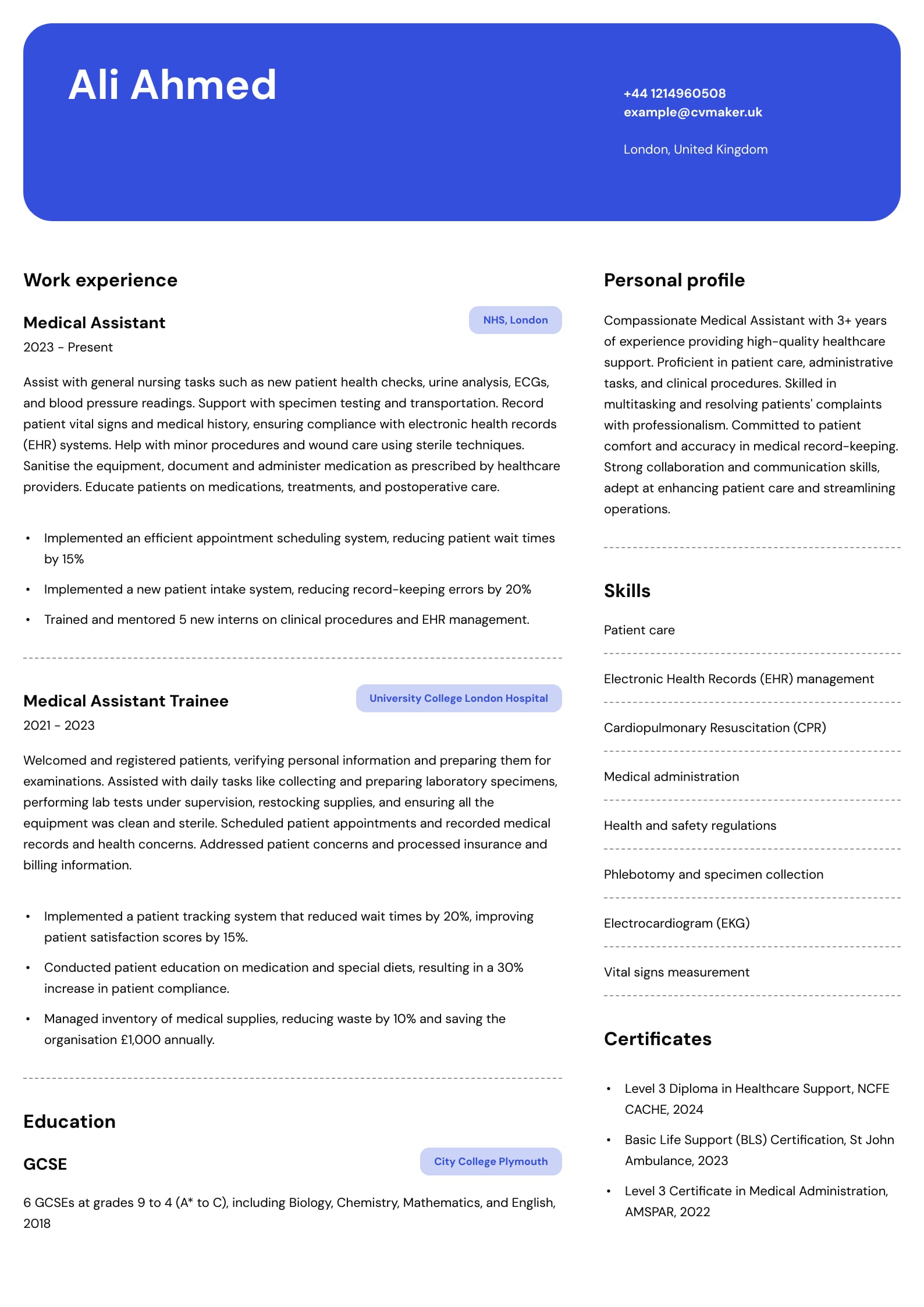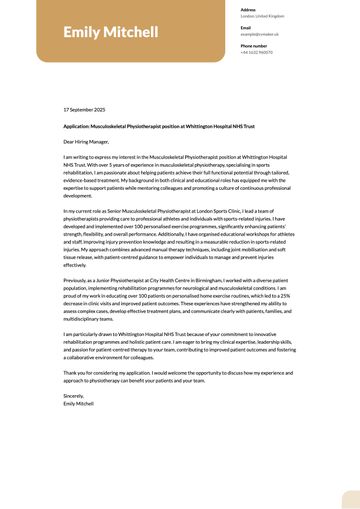
How to Write a Medical Cover Letter (Examples & Tips)
Medical professionals are a vital asset of any medical institution, responsible for diagnosing, treating, and caring for patients, making them comfortable and improving their overall well-being. Similarly, your cover letter like a good CV is the recipe for success, allowing you to present your talents and dedication to patient care. Despite the demanding nature of the job, workers in the medical field administer medication to the needy, drive medical innovations, and shape health policies.
In this article, we cover:
Examples and tips for different types of medical cover letters.
Step-by-step breakdown of each section of the medical cover letter.
How to customise your cover to a specific job even with no experience.
Explore our diverse array of cover letter templates, choose one, and effortlessly submit strong career documents. You can apply for jobs directly from our platform!

Medical cover letter example
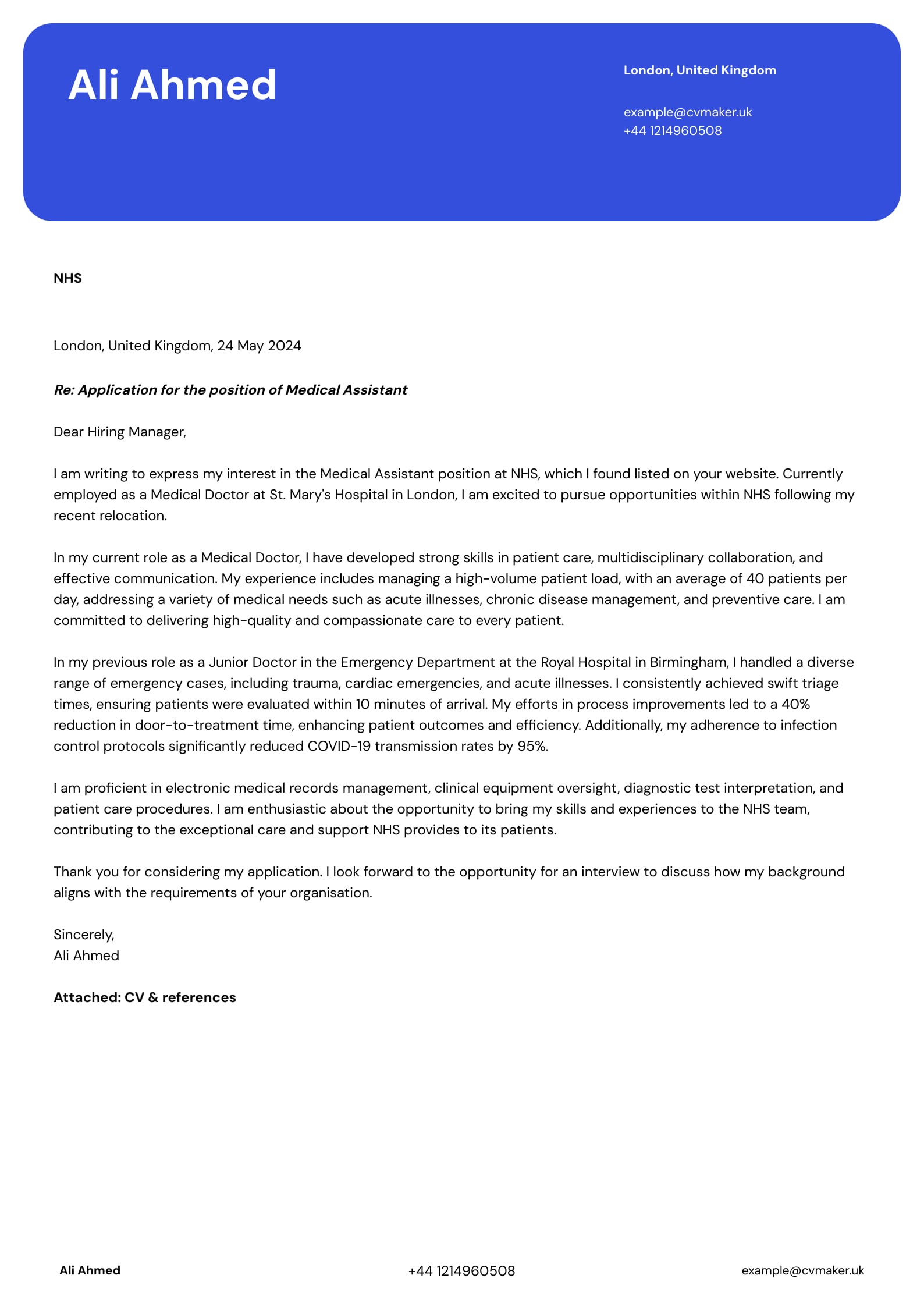
This cover letter example features Ali Ahmed, a medical assistant, seeking to advance to a senior role within the NHS. He uses a modern Erasmus cover letter template with easy-to-read language and formatting. He highlights his skills in patient care, medical administration, clinical techniques, and preparing laboratory specimens. Ali resorts to a basic format with short paragraphs, good structure, and readable fonts.
Need a CV? Check out our matching medical CV example to help you streamline your application, boosting your chances of getting noticed in the job market.
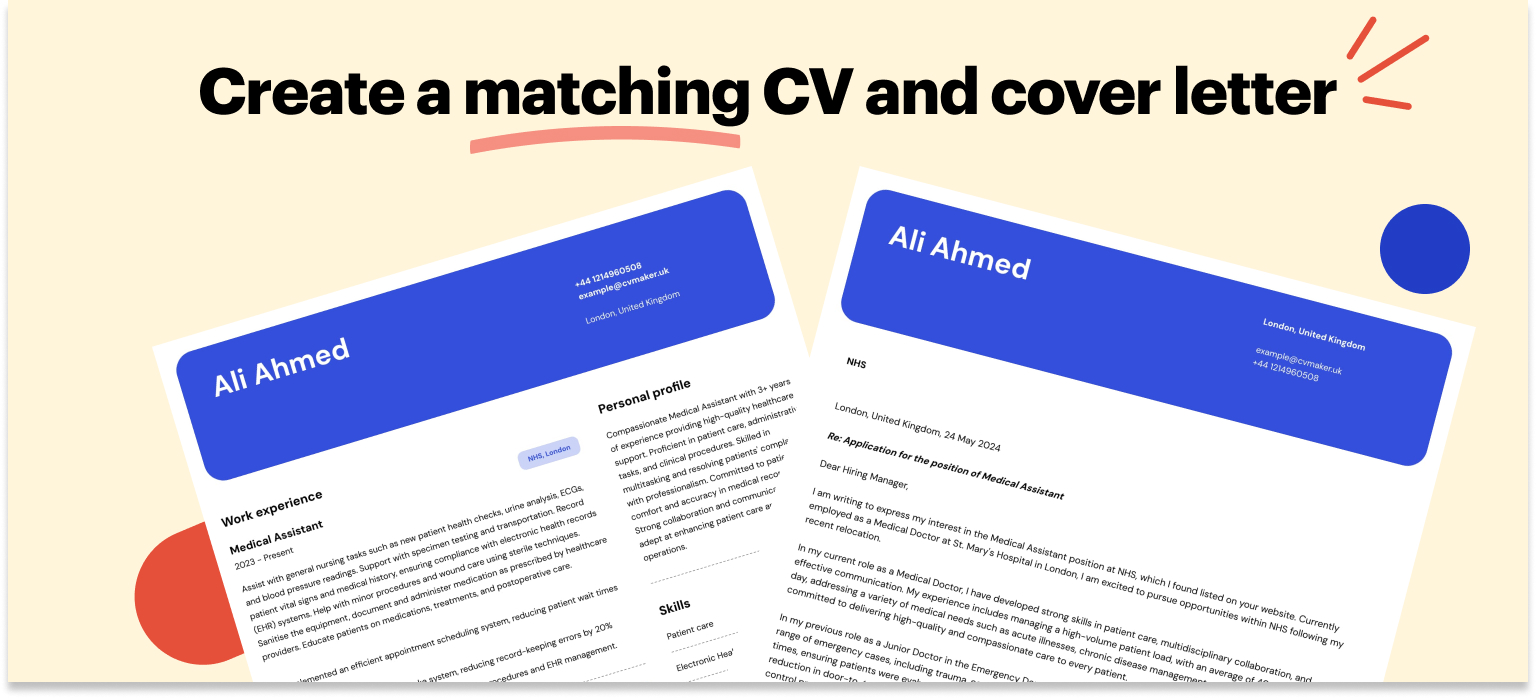
What to include in a medical cover letter?
Hiring managers and recruiters are looking for medical professionals with strong clinical knowledge and technical skills as well as strong empathy, communication skills, and a commitment to patient-centered care. A well-written cover letter is an essential tool for showcasing these attributes, making a memorable impression, and securing an interview opportunity.
Key sections to include for your medical cover letter:
Contact information
Salutation
Opening paragraph
Body paragraph(s)
Closing paragraph
Sign-off.

In the healthcare industry, there are various types of medical jobs to consider, including:
To learn more, refer to our blog article on how to structure your cover letter.
1. How to start a medical cover letter
Similar to a personal profile on a CV, aim to use the opening paragraph to hook your hiring manager's attention, highlighting your main achievements and skills. Convey your keen interest in the position, enticing them to continue reading your cover letter.
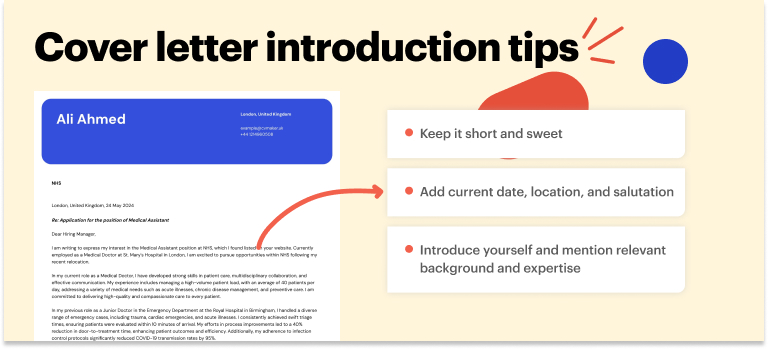
Medical Receptionist Introduction Cover Letter Example
With great excitement I heard from Debrah Miller about the job opening for the position of Medical Receptionist at your clinic. I’m passionate about helping others, providing comprehensive administrative support, and resolving any issues with patients. With my background in healthcare administration I have honed strong communication and organisation skills, fostering positive relationships between patients and healthcare providers.
For more information, refer to our receptionist CV example for more information,
Medical Assistant Introduction Cover Letter Example
am writing to express my interest in the Medical Assistant position at NHS. With my clinical and administrative experience, combined with a dedication to patient care, I am eager to contribute to your team. My hands-on experience in medical settings has honed my ability to perform both patient care and administrative tasks effectively.
For more valuable examples, refer to the blog article on how to start a cover letter.
2. How to write the body of a medical cover letter
This is the core section of your cover letter, giving a brief snapshot of your relevant skills, work experience, and achievements. Whether you are a recent graduate or an experienced medical specialist, demonstrate your patient-centred approach and desire to help others. You could also mention your courses and certificates, specialised training, or clinical skills. This is your opportunity to connect your qualifications to the job description, explaining how you can contribute to the company's success.
Depending on your role within the medical field, we suggest highlighting one of the top skills employers look for:
Keeping accurate patient records
Coordinate with healthcare professionals
Address patient concerns and provide support
Apply analytical skills to diagnose patients
Laboratory expertise and ability to understand medical conditions and procedures
Come up with effective treatment plans.
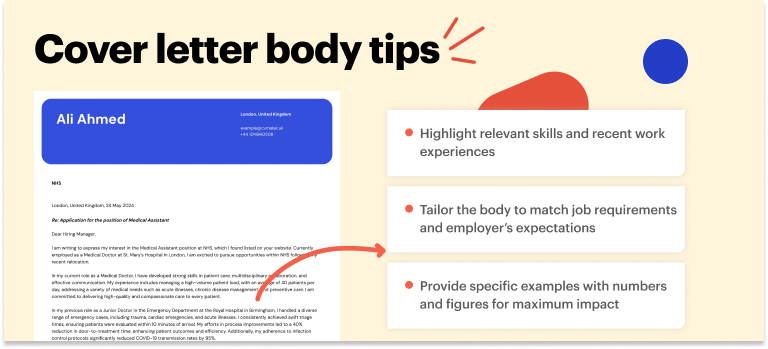
Medical Laboratory Assistant Body Cover Letter Example
Throughout my career as a Medical Laboratory Assistant, I have honed strong problem-solving and communication skills and a thorough understanding of laboratory techniques. My background includes conducting diagnostic tests, maintaining laboratory equipment, and assuring the accuracy of test results. I am confident that my technical skills and commitment to patient care make me a great addition to your team.
Medical Doctor Body Cover Letter Example
I have worked as a Medical Doctor for over five years in clinical settings. I have consistently shown my devotion to providing excellent patient care. My skills in diagnosing and treating a broad array of medical conditions, and fostering positive relationships with patients, ensure that I can contribute positively to your medical team.
Medical Laboratory Technician Body Cover Letter Example
As a Medical Laboratory Technician, I have expertise in performing laboratory tests and procedures, documenting and analysing results, and ensuring all the equipment is clean and sterilised before each use. I am able to meet tight deadlines and am eager to bring my analytical mindset to improve the efficiency and quality of laboratory services at your clinic.
For more tips, see our related blog articles on adding key sections for both CV and cover letter:

3. How to end a medical cover letter
It's essential to end your cover letter on a positive note, reiterating your interest in the role. Keep it simple and thank the recruiter or hiring manager for taking the time to assess your application. Add a strong call to action, such as scheduling an interview, and highlight how your background aligns with the company's mission and vision statements.
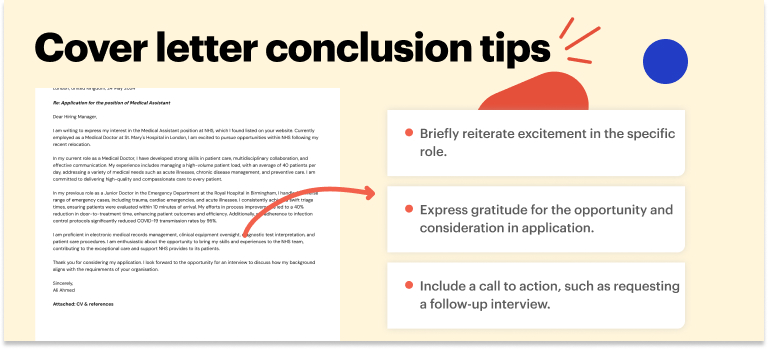
Medical Secretary Conclusion Cover Letter Example
Thank you for considering my application. I am eager to discuss how my background, organisational skills, and patient-centred approach align with the needs of your team. I look forward to the opportunity to contribute to to your healthcare services and assist the outstanding work of your medical staff.
Medical Office Assistant Conclusion Cover Letter Example
I appreciate your time in reviewing my application. With my background in medical administration and my devotion to providing exceptional patient support, I am confident in my expertise to leave a positive impact on your practice. I look forward to the chance to discuss how my skills and experiences align with your needs and contribute to the continued success of your healthcare team.
Check out our related article on how to end a cover letter for more valuable career advice.
How to write a medical cover letter with no experience
If you're a student or changing careers, it is essential to shift your focus from work experience to highlighting your transferrable skills, relevant projects, completed courses, or additional experience, like volunteering or internships to show your potential to perform the job.
Start with a concise introduction expressing your keen interest in the medical role and your eagerness to apply theoretical knowledge in a practical context.
Demonstrate how your academic a and extracurricular activities have prepared you with the core skills for the position, laying the groundwork for a compelling discussion in the body of your cover letter.
1. Mention your transferrable skills
Highlight key skills that you have gained from side jobs, school projects, volunteering, or extracurricular activities. Even if you don't have any medical experience, these skills could apply to various healthcare roles.
Patient-centred approach
Communication
Teamwork
Problem-solving.
2. Showcase your volunteer or internship experience
Describe any volunteer work, apprenticeships, or internships you've completed, focusing on tasks or responsibilities relevant to the medical profession. Emphasize the skills and knowledge you gained from these experiences.
Duties: assisting patients, documenting and organising files, providing administrative support.
Achievements: implement a patient education initiative, improve equipment maintenance regulations, introduce a new electronic health record system.
3. Bring qualifications and certifications to the foreground
If you've completed any relevant courses, certifications, or training programs, make sure to mention them in your cover letter. These credentials can demonstrate your commitment to learning and readiness for the role.
CPR training
Medical technology courses
First aid certification
Blood sampling training.
Example of a medical trainee cover letter with little to no experience
I completed a Bachelor's degree in Health Sciences from St. Luke's University. Throughout my studies, I actively partook in hands-on projects, such as performing patient assessments and developing treatment plans. For example, I worked on a group community health project to design weekly program leading to a 20% increase in participant engagement over six months.
As a medical trainee at Mercy Hospital, I gained hands-on experience shadowing physicians, helping with patient intake, and maintaining medical records. Notably, I revamped the patient scheduling system, cutting wait time by 30% in wait times and improving patient satisfaction scores. Through this work I have honed strong communication, adaptability, and presentation skills. I'm eager to apply my patient care skills as a Medical Assistant at NHS England.
For more information, refer to our related blog article on how to write a CV with no experience.
Key takeaways
As soon as you’ve mastered the writing techniques, and tailored your cover letter to a specific job, it’s time expand your connections, keep an eye out for opportunities, and apply for jobs Ensure to proofread your cover letter thoroughly to eliminate any mistakes and ensure you meet your organisation’s expectations.
Customise your medical cover letter for each job within NHS, clinic, or hospital you apply for
Focus on your most recent work experience and achievements, such as …
Demonstrate your strong communication with patients and staff, problem-solving, empathy, and presentation skills.
Clearly indicate the specific position you’re applying for and your reasons and motivation for the healthcare industry.
Give concrete examples of how your past achievements, such as implementing a health record system or improving patient scores, align with the job description.
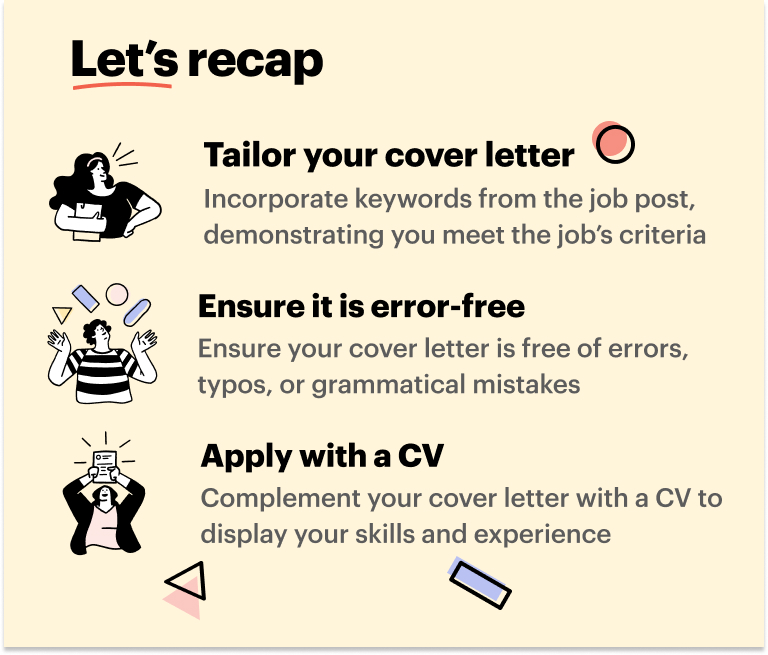
Next steps?
Now that you’ve learned how to create a medical cover letter, it’s time to apply your skills to action. First off, take a look at our cover letter builder which is easy to use and offers over 20 language options to create your career documents. If you need to iron out inconsistencies, consider reaching out to our CV Writing Service who can assist you in every step of the process.
For more inspiration, check out our diverse blog article on related topics:
FAQ
What is the average salary for a medical professional?
According to Talent, medical professionals have an average salary of £72,000 per year, with entry-level jobs starting at £54,321 and senior positions reaching £78,051 retrospectively. Medical directors, surgeons, anaestelogists, ophthalmologists, plastic surgeons, and psychiatrists are among the highest-paying professions in the UK. If you’re looking to advance your career, check out our related blog article on the highest-paying jobs that delves deeper into the salaries for the above professions.
What is the best format for a medical cover letter?
Stick to a one-page format with simple formatting, such as single spacing, professional font, and 1” margins. Ensure to include the core sections, such as personal details, header, salutation, an opening paragraph, two body paragraphs, a conclusion, and sign-off. Remember to focus on your most recent experience first, similar to a chronological CV format. Depending on the country and company you’re applying for, you might also attach a signature to boost your credibility.
For more advice, explore our blog article on the best font and best colour for your CV and complement your cover letter with matching information.
Do hospitals want cover letters?
It’s optional but submitting one can help you set yourself apart from other applicants and demonstrate your keen interest in the position. A well-written cover letter should complement your CV and give additional context about your expertise and reasons for applying.
For more information, explore our related article on how long should a cover letter be.
